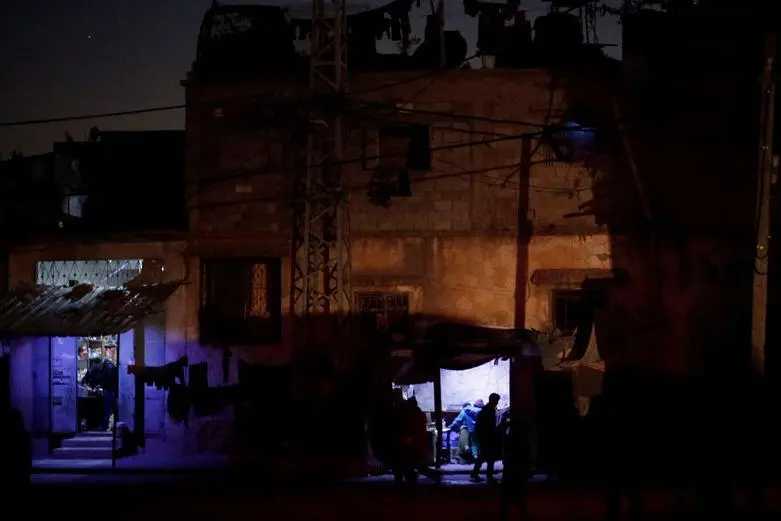PHOTO
By Nidal al-Mughrabi
GAZA, Jan 16 (Reuters) - An electricity crisis that has caused protests and unrest in the Gaza Strip eased on Monday after Qatar donated $12 million to buy fuel for the Palestinian enclave's lone power plant, officials said.
For weeks, Gaza's population of 2 million has been making do with barely a few hours a day of electricity - less than half its usual supply.
The Energy Authority run by the enclave's governing Hamas Islamist group said the Qatari-funded fuel would power a third generator at the power plant and help provide electricity in eight-hour cycles for three months.
The cash injection could also ease public pressure on Hamas, whose police forces clashed on Thursday with demonstrators in Jabalya refugee camp protesting against the blackouts. The Interior Ministry said that later in the day it would free several people detained in connection with the protests.
Gaza has demand for 450-500 MegaWatts of power a day but is receiving barely a third of that. About 30 MW is produced by its one ageing power plant, while 30 MW is imported from Egypt and 120 MW is supplied from Israel.
The West Bank-based Palestinian Authority, which pays for power supplied by Israel and Egypt, normally transfers fuel to Gaza and exempts it from most taxes. But because of its own financial constraints, it is no longer offsetting all the tax, angering Hamas.
Private generators provide electricity to those who can afford it in down times, but the costs of running them have spiralled. Some factories, bakeries and restaurants have had to lay off employees and cut working hours to survive.
The local power plant, which was heavily damaged by Israeli bombing during a war in 2006 and still only operates at about half of its potential capacity, could produce slightly more electricity but it needs more funds for fuel.
With unpaid consumer bills of around $1 billion, the power company is not in a position to seek more credit.
Officials say they need $500 million to rehabilitate Gaza's power network. But with Israel and Egypt maintaining a tight blockade on Gaza, getting replacement parts is difficult.
(Editing by Jeffrey Heller and Hugh Lawson) ((nidal.almughrab@thomsonreuters.com; 00970599401958; Reuters Messaging: nidal.almughrabi.reuters.com@reuters.net))
GAZA, Jan 16 (Reuters) - An electricity crisis that has caused protests and unrest in the Gaza Strip eased on Monday after Qatar donated $12 million to buy fuel for the Palestinian enclave's lone power plant, officials said.
For weeks, Gaza's population of 2 million has been making do with barely a few hours a day of electricity - less than half its usual supply.
The Energy Authority run by the enclave's governing Hamas Islamist group said the Qatari-funded fuel would power a third generator at the power plant and help provide electricity in eight-hour cycles for three months.
The cash injection could also ease public pressure on Hamas, whose police forces clashed on Thursday with demonstrators in Jabalya refugee camp protesting against the blackouts. The Interior Ministry said that later in the day it would free several people detained in connection with the protests.
Gaza has demand for 450-500 MegaWatts of power a day but is receiving barely a third of that. About 30 MW is produced by its one ageing power plant, while 30 MW is imported from Egypt and 120 MW is supplied from Israel.
The West Bank-based Palestinian Authority, which pays for power supplied by Israel and Egypt, normally transfers fuel to Gaza and exempts it from most taxes. But because of its own financial constraints, it is no longer offsetting all the tax, angering Hamas.
Private generators provide electricity to those who can afford it in down times, but the costs of running them have spiralled. Some factories, bakeries and restaurants have had to lay off employees and cut working hours to survive.
The local power plant, which was heavily damaged by Israeli bombing during a war in 2006 and still only operates at about half of its potential capacity, could produce slightly more electricity but it needs more funds for fuel.
With unpaid consumer bills of around $1 billion, the power company is not in a position to seek more credit.
Officials say they need $500 million to rehabilitate Gaza's power network. But with Israel and Egypt maintaining a tight blockade on Gaza, getting replacement parts is difficult.
(Editing by Jeffrey Heller and Hugh Lawson) ((nidal.almughrab@thomsonreuters.com; 00970599401958; Reuters Messaging: nidal.almughrabi.reuters.com@reuters.net))





















